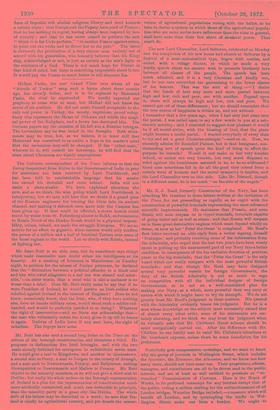The new Lord Chancellor, Lord Selborne, celebrated on Monday last
the completion of. his new house and church at Selborne by a festival of a semi-ecclesiastical type, begun with matins, and ended with a village dinner, at which he 'made a very kindly speech about his sincere wish to promote brotherly love between all classes of the people. The speech has been much admired, and it is a very Christian and kindly one but to our ears somewhat too patronising to the lower classes of his hearers. This was the sort of thing :—" I desire that the bonds of love may more and more prevail between high and low, rich and poor, one with another. Depend upon it, there will always be high and low, rich and poor. We cannot get rid of those differences ; but we should remember that- the true source of happiness is within us, and not without I remember that a few years ago, when I had only just come into the parish, I was called upon to say a few -words to you at a mis- sionary meeting ; and INentured to suggest how pleasant it would be if all would strive, with the blessing of God, that the place might become a model parish. I wanted everybody of every class to try and set a good Christian example,"—and so on. Now, we sincerely admire Sir Roundell Palmer, but is that benignant, con- descending sort of speech quite the kind of thing to effect the purpose be intends? Would it not make us feel very humble indeed, or rather not very humble, but very much disposed to rebel against the humbleness assumed in us, to be so addressed ?' Good men sometimes fail to do all the good they intend from a certain want of humour and the moral sympathy it implies, and the Lord Chancellor errs on this aide. Like Mr. Disraeli, though in a different sense, he is too much "on the aide of the angels."


































 Previous page
Previous page